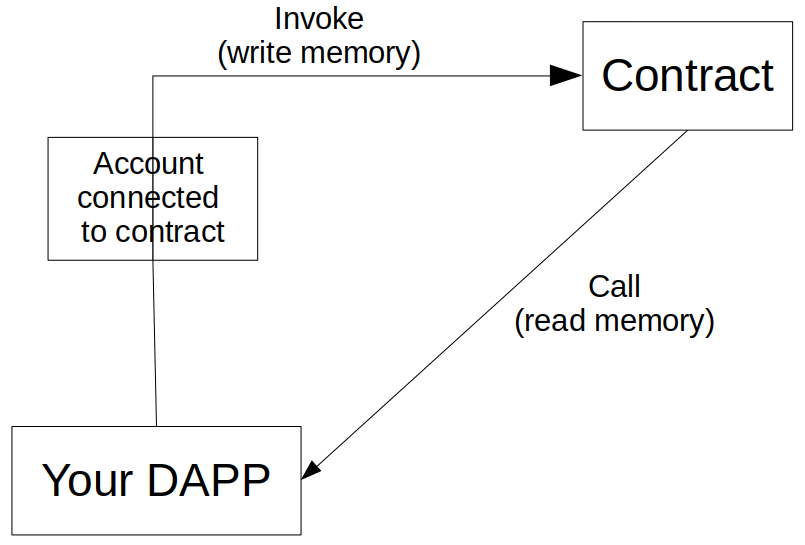Interact with your contract
Once your provider, contract and account are connected, you can interact with the contract:
- you can read the memory of the contract, without fees.
- you can write to memory, but you have to pay fees.
- On Mainnet, you have to pay fees with bridged ETH token.
- On Testnet 1 & 2, you have to pay with bridged Goerli ETH token.
- On devnet, you have to pay with dummy ETH token.
Your account should be funded enough to pay fees (0.01 ETH should be enough to start).

Here we will interact with a test.cairo contract (Cairo 0), already deployed in Testnet 1 and Testnet 2, at addresses:
- testnet1: 0x5f7cd1fd465baff2ba9d2d1501ad0a2eb5337d9a885be319366b5205a414fdd.
- testnet2: 0x2367db6b0df07033d196dcd25961109d8fbc86227158343149742284c7582e.
We will use Testnet1, so you need a funded wallet in this network.
This contract contains a storage memory called balance.
- It can be read with the
@view function: get_balance() - Balance can be modified with the
@external function: increase_balance(amount1: felt, amount2: felt)
import { Provider, Contract, Account, ec, json } from 'starknet';
🔍 Read contract memory, with meta-class
To read the balance, you need only to connect a Provider and a Contract.
You have to call Starknet, with use of the meta-class method: contract.function_name(params) (here params is not necessary, because there are no parameters for the get_balance function).
//initialize Provider
const provider = new Provider({ sequencer: { network: constants.NetworkName.SN_GOERLI } });
// Connect the deployed Test contract in Testnet
const testAddress = '0x5f7cd1fd465baff2ba9d2d1501ad0a2eb5337d9a885be319366b5205a414fdd';
// read abi of Test contract
const { abi: testAbi } = await provider.getClassAt(testAddress);
if (testAbi === undefined) {
throw new Error('no abi.');
}
const myTestContract = new Contract(testAbi, testAddress, provider);
// Interaction with the contract with call
const bal1 = await myTestContract.get_balance();
console.log('Initial balance =', bal1.res.toString()); // .res because the return value is called 'res' in the Cairo 0 contract.
// With Cairo 1 contract, the result value is in bal1, as bigint.
✍️ Write contract memory, with meta-class
To increase the balance, you need in addition a connected and funded Account.
You have to invoke Starknet, with use of the meta-class method: contract.function_name(params)
After the invoke, you have to wait the incorporation of the modification of Balance in the network, with await provider.waitForTransaction(transaction_hash)
Here is an example to increase and check the balance:
//initialize Provider
const provider = new Provider({ sequencer: { network: constants.NetworkName.SN_GOERLI } });
// connect your account. To adapt to your own account:
const privateKey0 = process.env.OZ_ACCOUNT_PRIVATE_KEY;
const account0Address = '0x123....789';
const account0 = new Account(provider, account0Address, privateKey0);
// Connect the deployed Test contract in Testnet
const testAddress = '0x5f7cd1fd465baff2ba9d2d1501ad0a2eb5337d9a885be319366b5205a414fdd';
// read abi of Test contract
const { abi: testAbi } = await provider.getClassAt(testAddress);
if (testAbi === undefined) {
throw new Error('no abi.');
}
const myTestContract = new Contract(testAbi, testAddress, provider);
// Connect account with the contract
myTestContract.connect(account0);
// Interactions with the contract with meta-class
const bal1 = await myTestContract.get_balance();
console.log('Initial balance =', bal1.res.toString()); // Cairo 0 contract
// increase_balance needs 2 felts, to add them to the balance.
const myCall = myTestContract.populate('increase_balance', [10, 30]);
const res = await myTestContract.increase_balance(myCall.calldata);
await provider.waitForTransaction(res.transaction_hash);
const bal2 = await myTestContract.get_balance();
console.log('Final balance =', bal2.res.toString());
Contract.populate() is the recommended method to define the parameters to call/invoke the Cairo functions.
Write several operations, with Account.execute
In a Starknet transaction, you can include several invoke operations. It will be performed with account.execute.
We will later see this case more in detail in this dedicated guide , but in summary, you use this command with the following parameters:
- address of the contract to invoke
- name of the function to invoke
- and array of parameters for this function
const result = await account.execute({
contractAddress: myContractAddress,
entrypoint: 'transfer',
calldata: CallData.compile({
recipient: receiverAddress,
amount: cairo.uint256(100000n),
}),
});
await provider.waitForTransaction(result.transaction_hash);
Other existing methods
Some other useful method to interact with Starknet:
Function name defined in the code
If you want to call a function with its name contained in a variable:
const listFn = ['calc-sum', 'calc-hash', 'calc-proof'];
// fnChoice is a number defined during execution
const res = await myTestContract[listFn[fnChoice]](200, 234567897n, 865423);
Light and fast call
If you want to have a very fast execution, with the minimum of resource usage:
const specialParameters: Calldata = ['2036735872918048433518', '5130580', '18'];
const getResponse = await myAccount.call('get_bal', specialParameters, { parseRequest: false });
You provide the low level numbers expected by Starknet, without any parsing or check. See more detail here